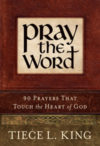When “I’m Sorry” Is Not Enough
Learning the Vocabulary of a Repentant Heart
By Tiece L. King
 Several months ago I joined with throngs of moviegoers to see Les Miserables. Ever since, I have been captured by the extravagant act of grace depicted by the lowly priest toward Jean Valjean, the ex-convict who could not escape his criminal past. When Valjean steals silverware from the priest and is caught by police, this gracious priest spares Valjean, claiming the silverware was a gift to Valjean. Then the priest even encourages Valjean to take two silver candlesticks (to add to his collection of stolen property).
Several months ago I joined with throngs of moviegoers to see Les Miserables. Ever since, I have been captured by the extravagant act of grace depicted by the lowly priest toward Jean Valjean, the ex-convict who could not escape his criminal past. When Valjean steals silverware from the priest and is caught by police, this gracious priest spares Valjean, claiming the silverware was a gift to Valjean. Then the priest even encourages Valjean to take two silver candlesticks (to add to his collection of stolen property).
Instead of turning Valjean in to the authorities who were waiting to take him away, the humble priest offered grace and saved the thief’s life. Valjean was shocked—beyond belief—to receive this blessing instead of a curse, life instead of death.
Throughout the rest of the movie Valjean wrestles with this lavish grace. He finally finds his heart and becomes a man of grace himself. But it began with two candlesticks.
This story reminds me of Jesus’ words to the adulterous woman who, according to the law, deserved the stoning execution the crowd intended to carry out at any moment. Yet Jesus said, “Neither do I condemn you . . . Go now and leave your life of sin” (John 8:11).
Heart Words
As followers of Jesus, our forgiven lives reflect the stories of Valjean and the adulterous woman. We receive the same extravagant grace of Christ. Confession and repentance—agreeing with God about our sin—open the channel of grace in our lives. Our words are key in helping us enter into the flow of this lavish grace.
When God said through the prophet Isaiah, “Come now, and let us reason together . . . though your sins are like scarlet, they shall be as white as snow” (Isa. 1:18, NKJV), He spoke of the confession of our mouths aligning with the truth about the condition of our hearts.
In our Western world, it is easy for our independence and freedom to gradually morph into prodigal defiance. Whether intentional or passive, the result is the same—soul atrophy. Only a disciplined engagement of our hearts and agreement with what God says about our sin will produce the lasting life and peace we all long for. This is the fruit of repentance and the flow of God’s grace.
Much has been written and spoken about our times, the swift current of our culture, and these effects on the Church. We have moved into an era in which words mean less—and conversations have been reduced to texted abbreviations and “hashtags.” In times past there was a contemplative art to the expression of one’s heart and matters of the soul. Yet in our techno-excessive world, in spite of many words, we are losing touch with our core and the ability for self-examination. This crucial ability to look at our hearts leads to greater godliness and leads us to Christ. We desperately need tools for repentance.
Liturgy: A Repentance Tool
Much of the Church today has stepped away from the use of written liturgy in our corporate worship gatherings. In doing so, we have lost a vital prayer/discipleship repentance tool. Liturgy offers us the language of repentance. Yet in turning away from liturgy’s “scriptedness,” we have failed to replace this discipline with an alternate tool. We are left to our own best efforts to adequately express repentance.
In general, we as the people of God have forsaken our ability to bring our hearts into agreement with God’s Word regarding our sin and the need for confession and repentance. We know how to feel badly about our sin and to say we’re sorry, but we do not know how to engage in the dialogue of grace called repentance.
King David gives us examples in the Psalms. And the early Church fathers followed these examples, seeing that their hearts needed to be jump-started to recognize the “sin that so easily entangles” (Heb. 12:1). Written confessional prayers (like those found in the Scriptures) have always helped open spiritual eyes to spiritual cobwebs.
Agreeing with the Word of God, personalizing it, and saying, “This is me; I have done this,” opens new doors in our hearts to the work of the Holy Spirit. We might read 1 John 2:15–17, for instance (“Do not love the world or anything in the world”), and respond, “That’s right—I should not do this.” But then we do little about it.
But if we respond that way, we can miss the opportunity for transformation available by embracing the grace of God and admitting, “This is what I do.” If we stop and pray the passage, personalizing it, and allowing the Holy Spirit to write it on our hearts, it might sound like this:
Father, Your Word says that I am not to love the world or anything in it. This is the desire of my heart, Lord. But I confess that my longing for my Starbucks cup of coffee this morning was greater than my longing for You! O God, forgive me. Teach me by Your Spirit what it means, what it looks like, to be in the world but not of it. Give me a thankful heart that can enjoy every blessing You give me without allowing my heart to be anchored to those blessings in any way.
Breath by breath, we can learn honesty about our heart condition as we increasingly incorporate repentance and confession into our faith walk. When we don’t recognize sin’s encroachment on God’s work in our lives (embracing His grace and forgiveness), our living becomes shame-based, without salt and light.
A Lifestyle of Repentance
In Western culture, any honest self-examination is a hard sell. Sin and repentance are increasingly considered “four-letter words,” often unspoken and unaddressed. But only as we learn to walk in a lifestyle of confession and repentance will we find true joy and fulfillment. This is where we learn to fully embrace grace. Learning this way of agreeing with God will grow humility in our lives, and we will become “grace-dispensers” to others as never before.
In our conversations with God (and one another), instead of blaming others or explaining away our behavior and attitudes, we will find greater freedom in pushing through shame and falling into the loving embrace of our heavenly Father.
Returning to this spiritual art of laying our hearts open before the One who knows everything—even what we try to ignore and hide—will become a soul discipline that deepens our relationship with the Father. It will move us past shame to find our real selves.
Our early Church fathers understood something we need to again embrace—that our hearts are prone to wander. That’s why I use and recommend written prayers as a stimulus to one’s prayer life. They can prime our hearts in our spiritual pilgrimage, pointing us toward greater Christlikeness. They reframe our living in light of God’s Word and teach us the vocabulary of a repentant heart.
Surely in our world of shrinking meaning, it is more important than ever to expand our “heart vocabulary.” Bringing our hearts with us, we lay all at the feet of Him who died to open the way of grace for us—immeasurably more than what began for Jean Valjean with two silver candlesticks. The rewards are endless, the joy unimaginable. We shall be forever changed.
TIECE L. KING is the prayer leader at The Evangelical Church of Bangkok, where her husband David serves as lead pastor. She is the author of Pray the Word, a line of resources designed to teach people to pray Scripture, available from prayershop.org. Click for Video word from Ty King.
Sidebar
Reveal the Hidden Things
By Tiece L. King
Thank You, Lord Jesus, for bearing my sin in Your body on the cross so that I might die to sin and live for righteousness. Thank You for the provision of healing found in Your great sacrifice. Forgive me, I pray, for the times I treat casually the freedom I have in You, do not live for righteousness, and allow myself to become enslaved again in the yoke of sin. Have mercy on me, Lord, and heal me, for I know I have sinned against You.
By Your Spirit, teach me what it means to “live for righteousness,” and to “seek righteousness,” that You, Jesus, may be seen in me more and more, and that lasting spiritual fruit may be born out of my life. Keep me from outwardly drawing near to You with words and actions and yet keeping my heart closed off to You.
I ask, Lord Jesus, that You open every closed chamber of my heart—places I am even unaware of—and expose them by the light of Your Spirit. Remove every cobweb. You alone can heal the broken and wounded places of my heart. Where I am blind to my own sin, restore my sight, I pray. Where the enemy is oppressing me and holding me back from deeper relationship with You, release me, Lord! I ask that You, my Healer, grant me complete freedom in areas of my life that have not yet been captured by Your great love. (Pause and ask the Holy Spirit to reveal the hidden things of your heart to you.) Only You can bring healing to the hidden places of my heart, and I invite You, Holy Spirit, to change me until I am conformed to the image of Christ.
 Destroy pride in me and everything that holds me back from sharing my pilgrimage with my brothers and sisters in Christ, from confessing my sins and finding healing. I praise You, Lord, for You are the One who heals me! And I trust in You for healing of my body, mind, and soul. These things I pray with confidence, Lord Jesus, because of Your finished work on the cross. Amen.
Destroy pride in me and everything that holds me back from sharing my pilgrimage with my brothers and sisters in Christ, from confessing my sins and finding healing. I praise You, Lord, for You are the One who heals me! And I trust in You for healing of my body, mind, and soul. These things I pray with confidence, Lord Jesus, because of Your finished work on the cross. Amen.
(1 Peter 2:24; Gal. 5:1; Ps. 41:4, John 15:16; Isaiah 29:13; Ps. 147:3; Zeph. 2:3; Rom. 8:29; James 5:16; Ex. 15:26)
Reprinted from a new book of written prayers, Pray the Word: 90 Prayers That Touch the Heart of God, by Tiece L. King. Available from prayershop.org.